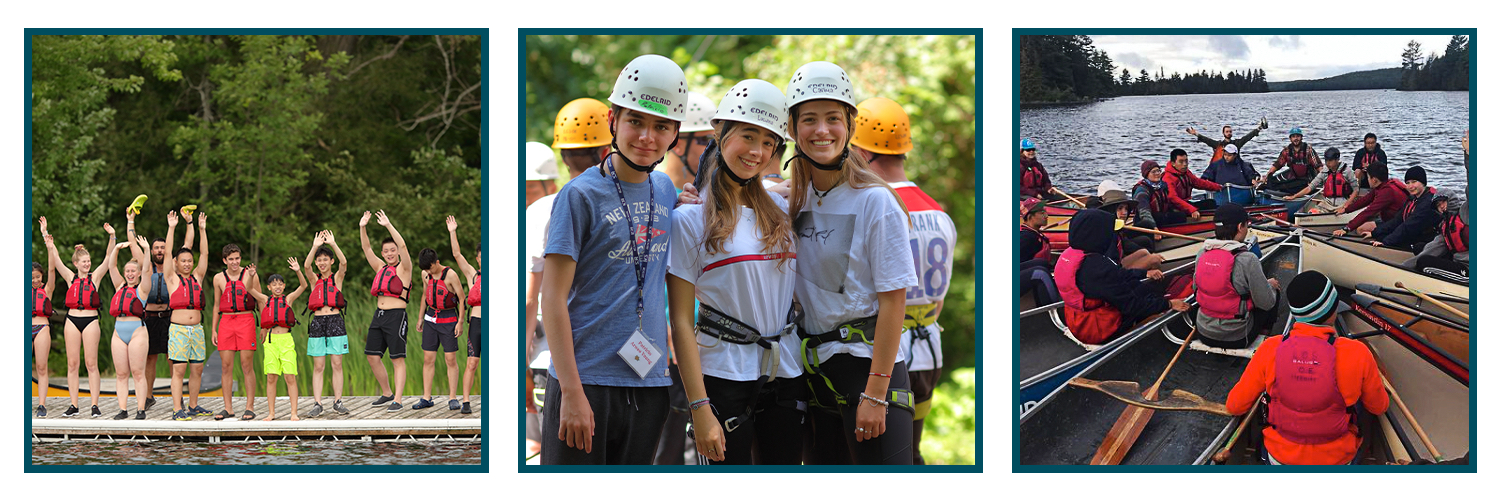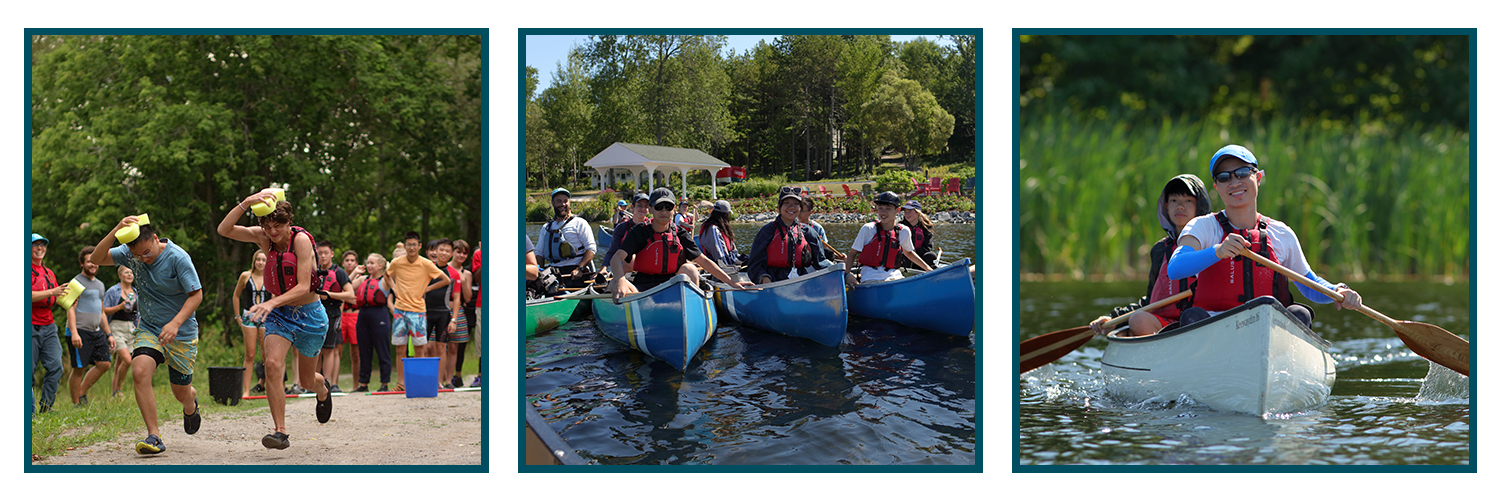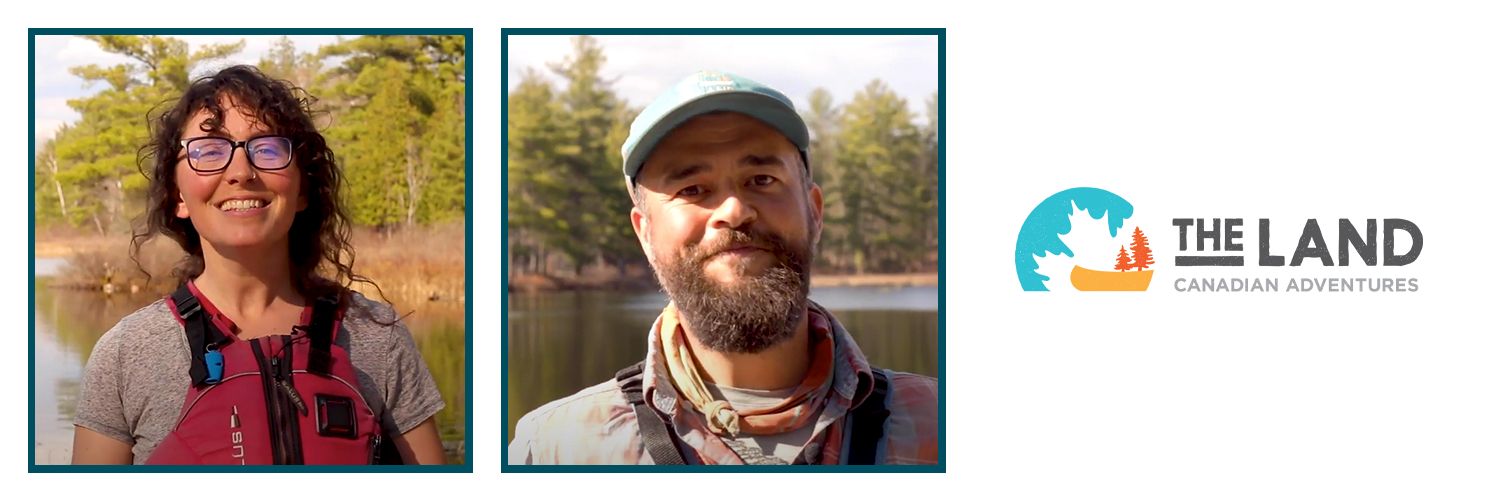
Lakefield College School’s Learning Languages through the Outdoors program offers students a unique opportunity to earn a credit in four weeks and improve their English or French language proficiency while enjoying the benefits of a Canadian summer outdoor experience.
What to Expect
When students arrive at LCS, they will be immersed in English or French, applying their new vocabulary and skills in outdoor classrooms and activities as they paddle, camp, build fires, identify native plants and animals, and much more.
Our courses include daily classes, with Grammar Workshops led by LCS English Language Learning (ELL) and French as a Second Language (FSL) Teachers plus unique Outdoor Education Study Hall sessions led by wilderness guides and outdoor educators. Each week culminates in an “outdoor adventure” that becomes more challenging and rewarding as students develop through the program.
The Benefits of Learning Outdoors
Each year, our students’ finals assignments and language proficiency tests indicate significant improvement in language reading, writing, listening, and speaking skills, an admirable feat given the concentrated timeframe of the four-week program. Furthermore, our ELL students tell us that this program helps them to prepare for success in adapting to the culture and academics found at an Canadian Independent boarding school.
Through immersive, authentic learning experiences, our students benefit from learning and growing in an environment dedicated to the education of the whole person; trust; a healthy, caring community; individuality; learning; citizenship; and environmental stewardship.
Our hands-on experiential approach integrates skills and language learning through 110 hours of expert language instruction in the great outdoors that results in the completion of an Ontario Secondary School credit.
Development of the Whole Person
Our Learning Languages Through the Outdoors programs focus on whole-person health and development. Our approach to outdoor education is simple because we believe that stable sleep, good food, plenty of full-spectrum sunlight, meaningful physical activity, reflective practice, and a purpose-driven life are the ways we can ensure we are doing our best before we look elsewhere for solutions to any obstacles we may face.
Building Trust
We create a safe and open space within which to develop trust in ourselves, each other, and our surrounding environment. We utilize hands-on activities to contextualize the language in a way that fosters a deep and meaningful understanding of the nuanced ways in which we communicate. By using the context of paddling tandem, for example – trusting a partner to hold the boat steady while we enter and exit the canoe, trusting the canoe itself to keep us afloat amidst the wind and waves, and finally trusting the water to carry and sustain us during our travel – we create an opportunity rich in meaning so that when we use words like ‘trust’, ‘confidence’, and ‘responsibility’, there is an immediate and real-life application of these new words and space in which to practise using them in a meaningful way. When our students recognize the immediate utility of a verbal or physical skill, they are much more likely to acquire and develop it quickly.
Practicing Joy
At LCS, we believe in the power of joy. We encourage our students to seek joy in the learning process by embracing connection with their peers and the natural environment. Whether we experience joy swimming through the sparkling lake, or examining the different native plant species, or laughing as we navigate the language learning process, we embrace these opportunities – big or small – to find moments of joy, both personally and as a group.
Fostering an Inclusive, Caring Community
Our experience has shown us time and again that an unplugged and self-propelled expedition through nature naturally creates opportunities to develop oneself and showcase skills that we may not have previously recognized in ourselves. We can’t think of a better way to practice paraphrasing and synonyms than through encouraging one another to stay motivated along the portage trail, with smiling faces, positive tone and using our new shared language. It’s even sweeter to hear these sentiments echoed back by other students and guides shouting out praise and support.

Celebrating Individuality
All of our programs have the underlying goal of connecting our students to themselves and others through connecting with nature. Additionally, our focus on trip-planning and traditional skills includes a boost in self-reliance that builds confidence and competence in our students across a variety of dimensions. Our genuine ELL and FLL instruction is designed to help students’ personalities shine, not only in their first language, but in their acquired tongue as well. Our programs encourage students to plug into their interests and aptitudes while acquiring new ones.
Achieving Learning Goals
The ELL programs begin by setting the foundations of positive group dynamics and introducing a wide variety of vocabulary for our students’ outdoor skills ‘toolbox’ in our online classroom before moving onto the in-person learning portion of the program. The French program, meanwhile, uses the initial three weeks of in-person learning experiences to prepare learners for a meaningful and achievable digital portfolio. In this rapidly changing world, an ability to flex and develop communication skills (in-person or online) and then apply those skills in different experiences is truly invaluable.
Encouraging Citizenship and Service
Our ‘Duty Roster’ practice demonstrates how we use reading skills in a wilderness setting to better understand the tasks we must accomplish for the betterment of the whole team. We use this as an opportunity for students to develop their leadership skills; everyone gets a chance to strengthen their skills in the roles of: Leader, Sidekick (Co-lead), Camp Meister (site and gear safety and maintenance), Navigator, and as part of each of the meal prep teams. The microcosm created within the team dynamic of a multi-day canoe trip is an experiential learning goldmine. Students must rely on a spectrum of physical abilities and a mosaic of outdoor skills to act and communicate in ways that positively impact their community.
Practicing Environmental Responsibility
Students are literally immersed in the waters and forests of the Kawarthas. Our guides and guest speakers are experts in a variety of aspects of the local environment from ecology and biology to foraging and bushcraft; at every step, we recognize that we are all visitors to this land and a large part of our role as guides and instructors is to create opportunities for students to notice, and reflect on what they are seeing, hearing, smelling and sensing and how they are feeling.
Meet the Educators

Lakefield College School has teamed up with The Land Canadian Adventures, an award-winning family business in North Kawartha, Ontario, specializing in four-season backcountry excursions, day adventures and teambuilding in Ontario and BC’s most beautiful locations. Co-founders Ms. Briagh Hoskins and Mr. Bretton Clark are multilingual educators, language teachers and wilderness guides and instructors whose decades of experience creating and delivering dynamic lessons and leadership to students of all ages, nationalities and professions have gone into designing and developing the Learning Languages through the Outdoors program with Lakefield College School. Throughout their careers, they have distinguished themselves through their confidence and competence in communication and commitment to lifelong and lifewide education. Their academic training is multidisciplinary and spans education, risk management, languages, biology, ecology and natural history, as well as sociology, philosophy and literature. Along with their team of wilderness guides at The Land, they bring many natural skills and experiences to bear on their mission to develop their students, including creative intelligence, empathy and courage.
